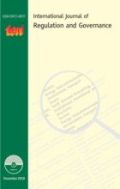Authors: Burns, Tom R | Roszkowska, Ewa
Article Type:
Research Article
Abstract:
This article develops the earlier analyses of the Pareto multi-agent problematique concerning collective choice situations, where members of a group, community or society, having diverse values, beliefs, and other predispositions, are faced with alternative allocations, institutional arrangements, or states of the world and may collectively choose a particular allocation, institutional arrangement or state of the world if they can agree on the choice. This type of multi-value governance situation is increasingly prevalent not only at political and societal levels, but also at the level of many enterprises, for instance, those advocating corporate social responsibility and working on economic as well
…as social and environmental goals. The article builds on research that has identified institutionalized governance mechanisms, which resolve confl icts of inefficient or non-optimal states and disequilibria. In other words, Pareto optimization problems, in the face of general non-unanimity or conflict regarding the outcomes among involved actors, can be resolved. The approach, based on Sociological Game Theory (SGT), has developed specific models of adjudication, negotiation, and democratic procedure and investigated their legitimacy bases, the limits of such societal procedures, and the accomplishment of societal efficiencies through such procedures. The re-conceptualization of the “Pareto problematique” is based on a general principle of “legitimation of collective choices”. Such collective choices are likely to be accepted by the majority or key agents (such as government agencies, businesses, NGOs, and so on) in the society. However, legitimacy does not guarantee effectiveness. On the one hand, it creates social order and sustainable society, on the other hand, a process legitimized by one or more of the societal legitimizing procedures may nonetheless lead to highly ineffective (or “inefficient”) outcomes, even catastrophes. There is no guarantee that legitimate collective choices are the best or right choices (this critique also applies to Pareto's approach, as we have pointed out elsewhere). In general, effective choices, whether legitimate or not, require the application of relevant or appropriate knowledge (often, multiple types of knowledge are required). Overcoming the dilemma of gaining social acceptance and achieving knowledge-based technical effectiveness requires dual (or multiple) governance systems. This article identifies and analyses the governance structures and procedures, which bring systematic knowledge to bear on collective choice problems. Many contemporary forms of collective decision-making entail mobilizing and applying expertise, such as technical and scientific, economic, organizational, legal, and cultural knowledge, and combining these with legitimizing procedures to gain acceptance of collective decisions and, thereby, accomplish social equilibria. A few models of such integrative governance systems are identified and discussed in the article.
Show more
Keywords: social optimum, societal procedures, collective choice, legitimacy, effectiveness, Pareto efficiency
DOI: 10.3233/IJR-120098
Citation: International Journal of Regulation and Governance,
vol. 11, no. 1, pp. 1-23, 2011
Price: EUR 27.50





